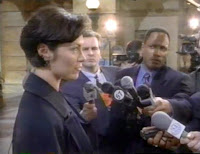The Review
On December 2, 1996, NBC aired The Prosecutors as its Monday Night Movie. Like any legal drama, The Prosecutors has at its center an interesting case: Carly Breen [Amelia Campbell], a repressed, second-grade teacher, meets a man online who "violates" her not with his hands, not with his penis, but with words appearing on her computer. Consider the year before you tell Carly just to change her screen name and get over it: 1996 was the beginning of the Internet explosion. Many people had yet to sign up for an AOL account, let alone venture into a chat room, and so were unclear about what could [or could not] happen in cyberspace. The Prosecutors examines how to punish sexual harassment in virtual reality—at a time when an online life was relatively new.
Intended as a pilot for a weekly series, The Prosecutors failed to get the green light from NBC, despite writer/producer Tom Fontana [St. Elsewhere, Homicide: Life on the Street] at the helm. What went wrong? The real genius of any television series is dropping the audience into the characters' lives at precisely the right moment. The Prosecutors, unfortunately, overshoots its mark by 20 or so episodes.
Writers have four common ways to kick off a series. They can open with a volatile pairing, two diametrically opposed characters whose circumstances require that they work together, their different insights and methods giving the audience a fuller understanding of what's happening onscreen. Fontana uses this technique on Homicide when Shift Lieutenant Giardello [Yaphet Kotto] forces the seasoned Frank Pembleton [Andre Braugher] to partner with the inexperienced Tim Bayliss [Kyle Secor]. The best first-episode combination is FBI agents Fox Mulder [David Duchovny] and Dana Scully [Gillian Anderson] on The X-Files. One character essentially throws down a handful of baking soda as an analysis, and the partner pours vinegar as a retort; the resulting fizzle so mesmerizes the audience that we don't care about either of their lives before the moment when they met.
TV series can also begin with a tragedy that compels the cast to unite and interact, introducing the audience to the players and their idiosyncrasies. Desperate Housewives does this with the suicide of Mary Alice Young [Brenda Strong], Six Feet Under with the death of family patriarch Nathaniel Fisher [Richard Jenkins].
A third common opening is the introduction of a neophyte, someone whose lack of experience matches that of the audience. As the neophyte gets schooled, the audience learns as well. Medical shows like Scrubs and the first season of Grey's Anatomy make effective use of this method as we get to see hapless interns enter the dance of life and death. In Oz, Fontana introduces the horror of prison by allowing us to see through the eyes of newly incarcerated Tobias Beecher [Lee Tergesen], whose freedom ended when he plowed down a bicyclist after having too much to drink.
And sometimes the story requires backtracking. Every episode of Law and Order, for example, begins with a body. The ensuing investigation backtracks through the victim's life to discover the murderer. Medical shows like House, M. D. open with a dying patient, a diagnosis and effective treatment plan initiated only after the doctors discover what happened before the person got sick. The most brilliant use of backtracking is Lost. The life experiences of the survivors of Oceanic Flight 815 are so compelling, so insightful about each character's behavior on the island, that we never mind when the story jerks us out of the jungle to visit these past events.
Writers can use these four techniques individually or in combination [Lost = tragedy + backtracking; Oz = newbie + volatile pairing of prison warden and Em City director]. But the choice or coordination must allow the audience to merge smoothly with the story.
And this is the problem with The Prosecutors. Writers Tom Fontana, Lynda La Plante, and Julie Martin give us a potentially volatile pairing in Assistant DA Rachel Simone [Michelle Forbes] and appeals lawyer Ingrid Maynard [Stockard Channing]. The able-bodied Simone commands the attention of any room; reporters respectfully hush when she speaks. Her confident stride is barely contained by the hem of her pencil skirt while stilettos follow after her feet like well-heeled dogs. In the courtroom, she champions her own opinion, twisting statutes and precedents to fit her beliefs. This brash attitude contributes to her courthouse stardom.
Events force the pairing of Simone with Maynard, who is different in many ways. Maynard's equally stellar career ended when an accident made her wheelchair bound. The loss of physical stature also reduced her confidence, and so she now prefers behind-the-scenes work instead of the glamour of trials. Unlike Simone, Maynard sees the law as formulaic. Guilt or innocence is a calculation; evidence determines the variables.
Why is this pairing ineffective? Simone is too gifted, Maynard too damaged. We needed one area of Simone's life not to work—children unhappy with the lack of attention, a husband resentful of his wife's success, pills or alcohol or illicit kisses sneaked in the ladies restroom, something to make the audience see that no one can have it all. NBC is network television, so we don't expect a top-of-her-game character to be as flawed as Showtime's Jackie Peyton [Edie Falco], but we do need an Achilles' heel, not a husband and children so supportive that no one minds how late dinner is even when it's Mom's schedule holding everyone up yet again. And Forbes can always sell a damaged character who has to be high-functioning, a talent this production overlooks.
Maynard would have been a more interesting character if she were unapologetic about her disability. Instead of letting us overhear a complaint about the steepness of an access ramp, what we should have gotten was our charioted lawyer streaking down it, pedestrians in her way be damned. If she had knocked someone's briefcase out of his hand during the ride, then she could have shouted over her shoulder, "I've warned maintenance about that ramp!" Flamboyance and a sense of humor should have masked her insecurities and anger about the handicap. Channing is certainly a good enough actress to communicate the bitterness bubbling underneath.
If the volatile pairing doesn't get the attention of the viewers, then we soon have a tragedy to grab us, as Simone's husband Michael Hall [Clark Johnson] is shot dead during a pizzeria robbery twelve minutes into the film. Unfortunately, Simone's grief is uninteresting. Instead of this death making her question her attitude about family, community, or the law, we get a woman out for revenge, someone who can use her insider knowledge and connections to get a fitting punishment, a perk denied the audience who daily suffers injustice without the resources to do anything about it. A moment of career appraisal would have given Simone an interesting depth—something like Fontana's Homicide episode "Blood Wedding" when ASA Ed Danvers [Zeljko Ivanek] has to acknowledge that his own complacent prosecution style is not what he wants for the murderer of his fiancée.
The Prosecutors also had the opportunity to hook us with a neophyte as Simone discovers that she has a new intern, Maria Valquez [Judy Reyes], who is replacing Bob or Rob, a young man suffering from exhaustion [that Simone cannot remember the name of her former underling is not an endearing characteristic]. Valquez is, however, already up to speed. She knows the case and the arguments; she never falters in an assigned task. As a result, we cannot find our way into the story through a confused newbie whose minimal understanding of procedures matches our own.
The Prosecutors is a season finale, not a pilot. Too many scenes make us aware of how much information we don't have, and the writers provide no backtracking to help. For example, at Hall's funeral, we notice that only his black family sits with Simone in front of the coffin. Is she an orphan? Or have her white parents abandoned her and their grandchildren because she married a black man? If we had a season's worth of episodes detailing how her racist family had refused to acknowledge the marriage, we would have felt anger and sympathy. The small-mindedness of her parents would have drawn us to her corner, but the writers deny us even this entrance into her life. And if the movie meant to show us how the disabled adapt and suffer, we should have first met Maynard at the height of her career, before the accident. If we don't get flashbacks, then what we need is for the story to start at a much earlier point, preferably 20 episodes prior.
That NBC failed to green-light The Prosecutors is probably a good thing. If the cast members found themselves committed to a hit series, we wouldn't have gotten the same Abbey Bartlet on The West Wing, the same Carla Espinosa on Scrubs, or another season of Juliana Cox on Homicide.
To View/Own the Movie
The Blockbuster database indicates that The Prosecutors is available to rent. I tried a variety of zip codes, including ones for New York City, the movie's setting, but could never find a store with an available copy. I searched WorldCat, the largest database of library holdings, but came up empty-handed there as well. Neither Alibris nor eBay had a copy for sale. The "detectives" at World-Wide Videos were also unable to help.
A copy can still be had, however, though its legality is dubious. Email me privately, and I'll tell you what I did to get mine.





Thanks for the review, Sparky!
ReplyDeleteDo you happen to know who the main script writer was? Lynda La Plante or Tom Fontana?
The professional reviews don't indicate which one was the main script writer. I do like this quote form The Baltimore Sun: "What we get are elements of the chain-smoking, ambitious, hard-driving Chief Inspector Tennison — a refreshingly original type for American television five years ago in the hands of Helen Mirren — chopped up and spread too thinly among three characters." I guess I'll have to add Prime Suspect to my already way too long list of things to watch!
ReplyDelete